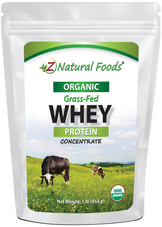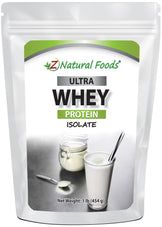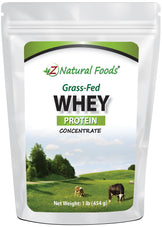Description
Description
One of the more popular topics we are asked about is the various aspects of whey protein and comparing the whey protein powder sources we provide at Z Natural Foods.
Today, we are providing deep answers to three of the most frequently asked questions we receive about our whey protein powders, which are:
- Is whey protein powder good for you?
- Does protein powder make you gain or lose weight?
- How much protein powder should be consumed daily?
As we get started, please note that we are aware that some individuals do not respond well to any type of whey protein due to potential allergies or sensitivities.
Therefore, the answers below speak in general terms, and we do not encourage those with known sensitivities or allergies to consume these foods.
Let’s get started!
1) Is whey protein powder good for you?
To answer this question correctly, it is essential first to look at how we define what is good for us and its relationship to specific foods that may affect your overall health.
In this case, “good for us” is defined as something of higher versatility and nourishing qualities.
So, we must look at the nourishing qualities the various forms of whey protein provide and their specific effects when accurately defining their nourishing attributes in this particular context.
Every culture defines how and why an individual food is considered “healthy” based on various factors.
According to Western medicine, healthy food is a substance that provides the nourishment needed to sustain well-being and retain energy.
Traditional Chinese Medicine looks at food from a slightly different perspective. According to TCM, food is not defined as healthy or unhealthy but, instead, if it is the right food for an individual at a specific time. According to Traditional Chinese Medicine (TCM), all foods have energy. TCM teaches us that foods have Yin/ Yang energy, five temperatures, five flavors, and four directions. In these principles, Yin and Yang's action is the general property, and temperature is the extremeness of the properties. In simple terms, Yin is cooling, builds blood, and has downward moving energy. Yang is warming, energizing, and has upward-moving energy.
In the case of protein powders, other factors must also be considered when attempting to conclude if they suit us.
Complete vs. incomplete proteins
A food is (by definition) considered a complete protein when it contains all nine essential amino acids(Histidine, Isoleucine, Leucine, Lysine, Methionine, Phenylalanine, Threonine, Tryptophan, and Valine). Proteins are not stored for later use. The body converts excess protein into glucose or triglycerides to supply energy or build energy reserves. When we eat a complete source of protein, the body breaks it down into amino acids to create muscle protein along with a host of other proteins in the body for enzymatic(Enzymes are essentially protein molecules) reactions. The nine essential amino acids also act as regulatory signaling molecules.
However, a food can be considered an incomplete protein if one or more of the essential amino acids are insufficient, even if all nine EAAs are present. Insufficient is defined in this case through the amino acid score. The score is calculated by dividing the content of individual EAAs in food protein by the content of the same amino acid in the reference pattern.
In the end, all the body is concerned about is having all nine essential amino acids when specifically creating muscle proteins and enzyme proteins. The overall result is the same whether the protein comes from a single source of complete protein like egg and whey or combined sources to create a complete protein like plant proteins. To be clear, this is not to say that other factors don’t affect the value and utilization of different protein sources.
Protein powder concentrate and isolate
Comparing a protein isolate and concentrate comes down to what you gain versus what you lose. Protein powder concentrates are considered the closest end product for what nature intended to provide us as a high-quality source of protein with all cofactors and constituents available for a balanced and complete source of nourishment.
The term concentrate can be misleading as it implies that the consumer is getting a quantitatively more significant amount of protein; This is simply not the case. You are getting a more well-rounded end product with a greater spectrum of uses that may benefit overall well-being. Protein isolates are more refined products and yield a higher amount of protein with the goal of specific targeted actions and applications.
Whey protein Isolate
- A complete protein yielding 90% protein concentration
- It contains no fat and carbohydrates
- It is high in branched-chain amino acids(especially leucine).
- It is considered an undenatured protein; however, if the raw material company uses a filtration process that uses heating components, it may denature the protein.
- Because components like beta-lactoglobulin, alpha-lactalbumin, immunoglobulin, and lactoferrin are proteins by definition, contrary to popular opinion, whey isolate does contain these critical cofactors.
- Whey isolate may contain a tiny amount of lactose.
Whey protein concentrate
- A complete protein yielding 80% protein concentration
- Approximately 3 grams of carbohydrates and 2 grams of fat per average serving
- Whey protein concentrate has many components, like beta-lactoglobulin, alpha-lactalbumin, immunoglobulin, and lactoferrin.
- It is a quality source of Branched-chain amino acids(especially leucine)
- It is an undenatured protein
- Whey concentrate does contain lactose
Therefore, the difference between whey protein isolates and concentrate comes down to
- How much protein, carbohydrates, and fat do you get from the product?
- The intrinsic details about the conditions under which the product is produced to create the end product.
- The individual’s specific goals.
Go here to review our Organic Whey Protein Concentrate.
Denatured vs. Undenatured Protein
Denatured protein is the alteration in the folding pattern of a protein by heat or chemical reaction from its original formation. Protein function depends on its structural shape, and heat causes proteins to vibrate, weakening the bonds that hold their complex shape.
When a protein has become denatured, it is no longer considered functional in the same elaborate manner.
Undenatured proteins are pure, properly functioning proteins without structural deformation, with all bioavailable nutrients and constituents.
Undenatured whey protein has many components, such as beta-lactoglobulin, alpha-lactalbumin, immunoglobulin, and lactoferrin. This is generally a much better choice for all intended purposes.
A protein denatured through cooking with heat or some other process is not necessarily bad because we always eat this form of protein.
For example, a hard-boiled egg is regarded as a form of denatured protein. The heat used to make a hard-boiled egg changed its structural integrity, but it still has excellent nutritional value and all the amino acids to create a complete protein.
We mustn’t use the term “unprocessed” to define an undenatured protein because everything goes through some processing to create an end product.
For example, whey protein isolate undergoes a precise filtration process that removes around 99% of the lactose and produces an end product yielding more protein per serving with less fat and carbohydrates.
Because no chemicals and heat were used in this process, the protein bonds were not weakened, so whey protein isolate is still considered an undenatured protein.
So, in essence, when you take all the factors above, a quality whey protein powder in its proper form (in general) is good for you and provides unique nourishing qualities and versatility to ensure you get nourishing compounds and sufficient protein in your diet.
2) Does protein powder make you gain or lose weight?
Some critical points about weight loss and gain must be made to answer this question correctly.
- There are many unique macronutrient-based diet plans on the market that have shown temporary weight loss results.
- The quality of your food does matter. Low-quality, highly processed food and ingredients may create an unhealthy inflammation response within your body and may affect overall results.
- Weight gain and weight loss are a matter of calorie input versus one's activity level and ability to burn those calories. Simply put, eating less than what you burn will result in weight loss, and eating more than what you burn will result in weight gain. But, if not done correctly, it comes at a cost.
- Your macronutrient(protein, fat, carbohydrates)ratio can strongly influence your ability to make a sustainable change in your body composition (gain muscle or lose body fat).
- Understanding that not all weight gain or loss is the same is vital. Gaining 10 pounds of fat versus muscle can negatively affect your overall well-being. If you lose 10 pounds of weight and seven is muscle, are you really better off?
So, the simple answer to this question is that protein powders, as individual entities, when used appropriately, do not make you fat. They help you build and sustain quality muscle. The outside sources, quality, and quantity of fats and carbohydrates you add to a protein powder will profoundly affect whether you lose or gain weight and how your body composition changes.
3) How much protein powder should be consumed daily?
The amount one should consume of protein powder daily depends on several factors.
First, understand that high-quality food sources of protein like meat, eggs, fish, and high-quality dairy foods take priority over supplemental powders.
Next, it is vital to understand your protein requirements based on your age and activity level. It seems to be well accepted across the board that for those who are inactive or don’t incorporate resistance training into their lifestyle, around ½ of a gram of protein per pound of body weight is sufficient.
For active people who incorporate resistance training 3-5 times a week, around one gram per pound of body weight is a reasonable goal. If you are a high-level or competitive athlete, there is a possibility that your needs may be higher.
Correctly answering the above question of how much protein powder should be consumed daily has more to do with your food choices and habits. Once you figure out your total daily grams, divide that by four or five (depending on how many meals you eat).
While It is not suggested that you use a powder as the primary source of protein for every meal, adding them in during specific times of day may support your overall wellness goals. One of the purposes of using protein powders is faster and easier digestion and utilization; therefore, timing your consumption for optimal recovery is the primary goal.
So, for those who are inactive or have a low level of activity, one serving of whey concentrate before bed to support recovery when you sleep is a good choice.
This form of whey protein will act slower (more time-released) to nourish the body throughout the night. Because you are getting so many essential nutrients and compounds, high-quality protein, and a good source of fat, whey protein concentrate is ideal for supporting a healthy immune system and recovery.
Remember, whey is more than just a good source of protein. If you are more active, then one serving of whey isolate post-workout and one serving of whey concentrate at night would be appropriate for your needs.
In conclusion, there are no perfect answers to the above questions because many factors play a role in the quality of the product and how the product is best utilized based on the individual's needs.
With that said, you now have thorough information regarding all the various factors that play a role in protein powder consumption so you can obtain optimal results based on your individual needs.
To review all of our protein powders, go here:
To review our popular Ultra Whey Protein Isolate, go here:
To review our popular Organic Whey Protein Concentrate, go here:

























